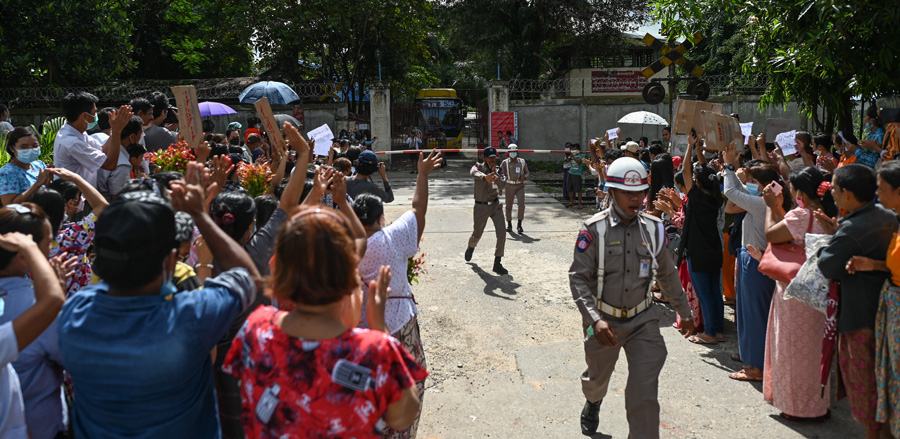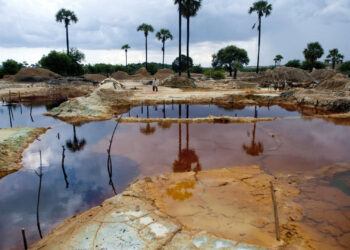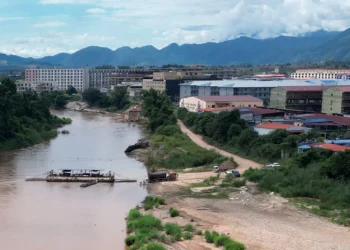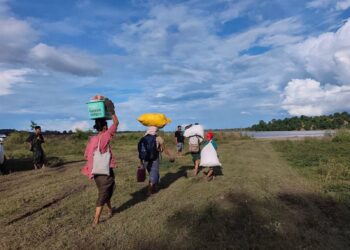
Over 20 years ago in exile, I co-founded the Assistance Association for Political Prisoners (AAPP) to monitor political prisoner numbers in Myanmar, so we can advocate and lobby the outside world to apply pressure on the Myanmar military, which once again seized power on February 1.
On October 18, I saw the success of that political pressure when the junta announced a mass prison release days after coup leader Senior General Min Aung Hlaing was rightfully excluded from the October 26-28 Association of Southeast Asian Nations (ASEAN) summit.
This is not the first so-called amnesty since the coup and it must not be the last. Yet, the outside world must continue to pay close attention. The junta will use so-called prisoner releases to deceive. On June 30, the regime announced the release of 2,342 prisoners. But AAPP has identified only 371 prisoners who were actually freed. Most remained in detention and their torture continued.
It has been over two weeks since the junta announced on October 18 the supposed release of another 5,636 political prisoners. Only 4,072 of those detainees have had their releases confirmed by AAPP, but just 949 of them have been properly identified because the military refuses to be transparent.
Our democratically-elected leaders remain in prison, as do many others as hostages. Arrests and killings by the junta have not slowed down. On October 23, the 1988 generation activist Ko Jimmy was violently arrested at a home in the Panglong housing complex in Yangon’s North Dagon Township. Another bargaining chip for the military regime in any future “concessions”.
Thousands of less well-known political prisoners are at risk of being forgotten by the outside world. This is what the Myanmar military wants. Therefore, they arrest people in the middle of the night, refuse to acknowledge the location of detainees or to allow independent observers inside prisons. This corrupt and power-hungry institution wants to make it as difficult as possible for ASEAN and others to know how many people they arrest, and whether any amnesty is authentic.
Actually, the stories of re-arrests outside prison gates and at homes soon after release demonstrate the reality of the junta’s tactics. Kyaw Naing Tun was one of those released from Magwe Central Prison on October 19, but the former political prisoner was re-arrested just eight days later. He was taken to an interrogation center and tortured to death, His body, and in particular the back of his head, had been violently smashed.
At least 127 detainees supposedly released on October 18 have been re-arrested since then. Among them were 11 democratically-elected politicians who were taken to the gates of Meiktila Prison, only to be cynically re-arrested by the police and charged under the Counter-Terrorism Law.
This is a pattern from before the February coup. Min Ko Naing, another 1988 generation activist, was released on two separate occasions during the time of the previous military regime, and both times was soon re-imprisoned.
It was the same story for leading National League for Democracy (NLD) member U Win Htein, who on October 29 was sentenced to 20 years imprisonment in a Naypyitaw detention center under Section 124(a) of the Penal Code. Back in 2008, U Win Htein was waiting in a guesthouse to be reunited with his daughter after being released from prison. It was less than 24 hours later when military intelligence sent him back to Katha Prison and charged him under the State Protection Act, a repressive piece of legislation subsequently repealed by the now ousted NLD government. Such re-arrests are motivated by the desire of the military to psychologically intimidate others.
Treating political prisoners like pawns, the military re-arrests them just when they think they are free. AAPP released a statement on this tactic after October 18, highlighting the impact on the mental health of political prisoners and families. In fact, this is a type of psychological warfare, a torment which does not end with conditional release. Forced to sign pledges, all can be re-arrested at any time, for any reason, under Section 401 of the Penal Code.
This is how it was in the past when persecution continued long after detention ended. Former political prisoners were always the first target if something went wrong in a community and they were continually harassed as a type of social punishment. When I was released for the first time in 1993, businesses felt intimidated to hire me and military intelligence followed my every move. It was not long before I was arrested again and sentenced to a longer, harsher term.
While in prison, protestors detained for practicing fundamental human rights are forced to hold stress positions for hours, sticks are used to repeatedly hit their shins and backs, they are refused anything to drink, and made to hear the screams of fellow inmates. Even if they are spared brutal interrogation, political prisoners are housed in overcrowded cells and need to bribe guards just to get enough space to sleep, enough food to eat and water to drink. Every day is a struggle to survive. These are experiences that AAPP staff understand intimately.
The scars of torture linger long after detention. A young man from Taunggyi, the capital of Shan State, was arrested on August 8 on unfounded suspicion of links with a People’s Defense Force. He was released the next day with wounds across his body consistent with severe torture. The man could barely speak, traumatized through vicious interrogation by the junta. Photos circulated of another detainee from North Dagon in Yangon, showing his neck tattoo burned off by cigarettes. The tattoo read “we will never forgive”, a reference to the Myanmar peoples’ hatred of the coup and desire for justice.
Nowadays, people in Myanmar know that the coup leader’s greed and brutality will impoverish entire generations. We’d seen the prospect of a better future. Political prisoners and the entire population profoundly hate Snr. Gen. Min Aung Hlaing for destroying that possibility and will never subject themselves to his rule, whatever the level of repression. Brutal interrogations, however, will create long-term mental health implications. Former political prisoners and their families need urgent support. Fundamentally, Myanmar is a deeply traumatized society. Just being released is not enough; we need accountability to tackle the loss of dignity.
Families embracing loved ones after being released is one of the reasons I really appreciate what ASEAN did on October 15 by excluding the coup leader from its October summit, as well as the support of the United States and other like-minded governments since the coup. It was political pressure which allowed the possibility of rehabilitation to happen. Nowadays, the junta does not have legitimacy from its own people, its neighbors or the international community.
Before the coup, the military’s spokesperson Zaw Min Tun said torture survivors and families could make complaints to the military. People in Myanmar understand, then and now, that you cannot submit a complaint of torture to the torturer, when that same torturer continues to hold a gun to your head on release. People in Myanmar need a civilian government, with no role for the military in politics or government.
This why ASEAN’s decision to deny the coup leader the legitimacy he craves was so significant. Special Rapporteur Tom Andrews powerful statement said of the subsequent prisoner ‘amnesty’, “their release is clearly not because the junta has had a change of heart”. The October 18 releases happened because of pressure from inside and outside Myanmar. But I want to advocate for the international community to do more. The international community’s demand now must be for the release of detained State Counselor Daw Aung San Suu Kyi and President U Win Myint, all other political prisoners, and a return to civilian rule.
For this purpose, United Nations (UN) member states need to implement the Special Advisory Council for Myanmar’s ‘Three Cuts” policy. The office of the UN High Commissioner for Human Rights spoke for civilians in Chin State and Magwe and Sagaing regions earlier this month. It noted the junta’s “established pattern of attacks… against unarmed individuals using lethal force, destruction of residential properties, mass arbitrary detention and deaths in military custody”. As long as the Myanmar military has cash and weapons, atrocities will continue.
Source: Irrawaddy






